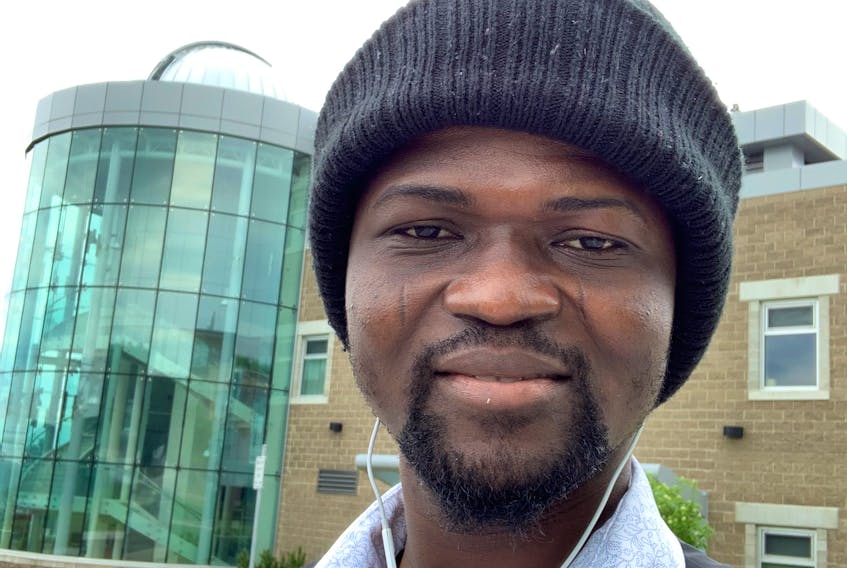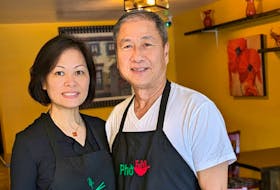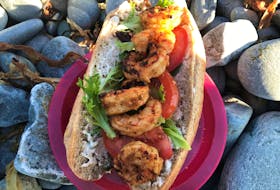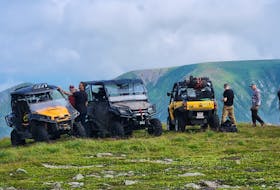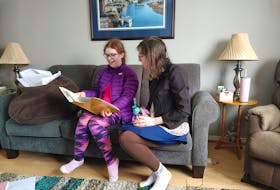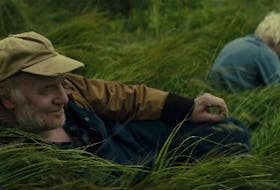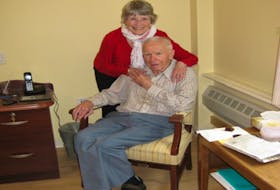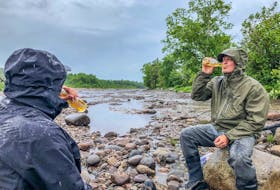CORNER BROOK, N.L. — CORNER BROOK — Abdul-Latif Alhassan never considered himself to be leader, just someone trying to make life better for other people.
But an opportunity to participate in the Mandela Washington Fellowship Program for Young African Leaders at Kansas State University in 2019 changed the mind of this Ghanaian man who now calls Corner Brook home.
“To be recognized by the U.S. State Department as a young African leader … makes you know that what you are doing is not in vain and people are noticing whatever you are doing," he says.
RELATED:
- 20 Questions with Hope Jamieson, former St. John’s city councillor
- 20 Questions with Grand Falls-Windsor teen and entrepreneur Emily Hewlett
- 20 questions with Newfoundland and Labrador podcast host Bryan Tobin
“It makes me feel like wanting to do more, and also help mentor other people so that they can also do better for our society.”
Alhassan, 31, was born in Kpachelo, a small village in northern Ghana. He was about 10 when he moved to Tamale to live with his grandmother and further his education.
He couldn’t speak or write English at the time. By the age of 18, all that had changed.
Alhassan has an undergraduate degree in geography and resource development from the University of Ghana. His thesis work looked at the role of non-governmental organizations (NGOs), and their impact and the challenges they face, in his region of Ghana.

“There’s so many small- and medium-sized NGOs operating in the region, but the challenge is that most of them lack capacity to effectively implement projects.”
With a lack of co-ordination and co-operation, it was as if “everybody was paddling their own canoe and doing their own things,” he said.
His recommendation was that if these small- and medium-sized organizations came together, they might be able to do better than just standing alone. It was the basis for the formation of the Civil Society and Institutional Foundation (CSIF), an NGO founded by Alhassan and a friend.
When the Mandela fellowship finished, Alhassan returned to Ghana for four weeks in order to get his study permit to come to Canada, something he’d always wanted to do.
An African Leaders of Tomorrow scholarship from the Canadian Bureau for International Education made the move possible, and he came to Corner Brook a year ago and started the environmental policy master’s program at Grenfell.
After having spent some months in the U.S., Alhassan came to Canada during a time when racial tension, privilege and Black Lives Matter make up the news of the day.
“I wouldn’t say I haven’t seen any of those things here, but it’s not like on the same level (as) in the United States. Canada is quite OK and peaceful, and people are calm and respectful and appreciate the diversity.”
He laughs now at how for the first time being the only Black person on a plane made him feel like a minority or different from others.
But that feeling didn’t deter his positive outlook.
“It was exciting for me because I like to explore and to just see other places. I like the adventure and just taking on new challenges. Even though it’s a new environment, I’m always looking out to what is in there for me and what I can offer.”
What he has found in Corner Brook and at Grenfell is a community that is welcoming. And the environmental policy program has led to more opportunities.
As part of the program, Alhassan had to complete a 12-week internship and worked with Feaver’s Lane Enterprises Inc., a GIS consulting firm in St. John’s.
Because of the COVID-19 pandemic, he worked from home doing market research and working on his personal development by attending virtual conferences and webinars.
"I like to explore and to just see other places. I like the adventure and just taking on new challenges. Even though it’s a new environment, I’m always looking out to what is in there for me and what I can offer.” — Abdul-Latif Alhassan
During his internship, he learned of the International Institute for Sustainable Development (IISD) and its 2020 Lake Winnipeg AquaHacking Challenge. It is a program to challenge students, water researchers, developers, designers, scientists, programmers, engineers, technology enthusiasts and entrepreneurs to save Lake Winnipeg.
Alhassan is part of a team called AbbaTek. Its members are from all across the country, who — unstopped by the COVID-19 pandemic — meet virtually to develop a solution for reducing uncertainty in microplastics research.
Their Compound Connect is an algorithm and all-in-one application for microplastics analysis and data-basing that has passed the semifinal stage of the challenge and is being further refined for the final in October.
“We are tackling a challenge in challenging times, and so we have to be innovative and work with what we have.”
With the master’s program completed, Alhassan is getting set to return to Ghana this month, but he plans to come back to Corner Brook to pursue other educational opportunities.
“Newfoundland has been a home for me and probably going to be for the next few more years.”
20 Questions
1. What is your full name?
Abdul-Latif Alhassan.
2. Where and when were you born?
Kpachelo, a small village in the northern region of Ghana, in January 1989.
3. Where do you live today?
Corner Brook.
4. What’s your favourite place in the world?
Tough one for me, because I make my bed where I lay my head. I love to travel and enjoy the beauty of nature, of places and people. Some of my best places include Tamale, Ghana, where I grew up, Lake Victoria in Uganda and, of course, Newfoundland, my new home.
5. Who do you follow on social media?
A lot, but basically categorized into sports, leadership and development, family and friends, comedy and fun stuff as well.
6. What would people be surprised to learn about you?
I am one of 18 siblings, Number 2 or Number 12 depending on how you look at it. I come from a polygamist home.
7. What’s been your favourite year and why?
I will say 2019, because that is the year that several years of hard work paid off. I grew up in an area where access to education is a privilege and not a right and for me to see people that my NGO Civil Society and Institutional Foundation (CSIF) and our projects supported to have quality tertiary education, it made me happy and urged me to do more because it means a lot to so many young people and families. Fifteen young people have had access to quality basic and tertiary education thanks to interventions/projects of CSIF. Some of them are now nurses, teachers and giving back to society. The difference that makes in people’s lives gives me satisfaction. It is also a year I got the chance to meet several inspiring young leaders from different African countries in the United States through the Mandela Washington Fellowship (MWF) Program.
8. What is the hardest thing you’ve ever done?
I will give two. Staying committed to an idea/cause from the beginning to seeing it fully operational. I co-founded the CSIF in Tamale, Ghana, with a friend when I was still an undergraduate student and the journey was tough. At some points I had to find other alternative means to stay afloat and still carried the vision, but I never gave up. (While) leading a team of volunteers from the United Kingdom and Ghana under the International Citizen Service (ICS) program in 2015, an incident or a conflict involving a host family and their volunteers influenced my perspectives on citizenship, leadership, conflict management, relationships and how to manage people from diverse backgrounds.
9. Can you describe one experience that changed your life?
My basic school head teacher noticing potential in me at such a tender age and convincing my senior brother to take me from the village to continue my education in the northern regional capital city of Tamale changed my life. While at that, I went to pester my brother in his office for my school fees one day during my high school time. I saw a silent message in his eyes telling me, as he removed the last amount of money in his pocket, that I am betting my last penny on you and you shouldn’t disappoint me. He didn’t say these words to me, but I vowed that very day not to disappoint him and to be exceptional and make a difference in my own life and that of others. Guess how much that was? Fifteen dollars Canadian in today’s equivalent.
10. What’s your greatest indulgence?
Putting smiles on people’s faces and getting someone annoyed with my incessant questions.
11. What is your favourite movie or book?
“The Blacklist” (movie), “Confessions of an Economic Hitman” (book).
12. How do you like to relax?
Listening to reggae, chatting with friends and family, surfing the Internet and just going out to watch and enjoy the beauty and wisdom of nature.
13. What are you reading or watching right now?
I am watching “The Blacklist” for the umpteenth time.
14. What is your greatest fear?
My greatest fear is to fail those people who look up to me for inspiration and hope. I may be alone here, but I carry the will of many.
15. If you were singing Karaoke what would be your song?
“Zion Train” by Bob Marley or “Southern Cross” by Crosby, Stills and Nash.
16. What is your most treasured possession?
My mind and network of people in my life.
17. What physical or personality trait are you most grateful to a parent for?
Honesty. Both parents taught me to speak the truth even at the point of death.
18. What three people would join you for your dream dinner party?
Unfortunately, some of them are no more alive, Kwame Nkrumah, the first president of Ghana, Steve Jobs and Zinedine Zidane, a French footballer and coach.
19. What is your best quality, and what is your worst quality?
My best quality is my perseverance and my worst quality is that I find it so hard to give a second chance to anyone who betrays my trust.
20. If you didn’t take this career path, what would you have chosen?
I would have been a footballer. I was very good at it at a young age, but was forced to abandon it in order to concentrate on my education. There is this flawed notion in my part of the world that you can’t combine academics/education and sports and be effective or successful.

